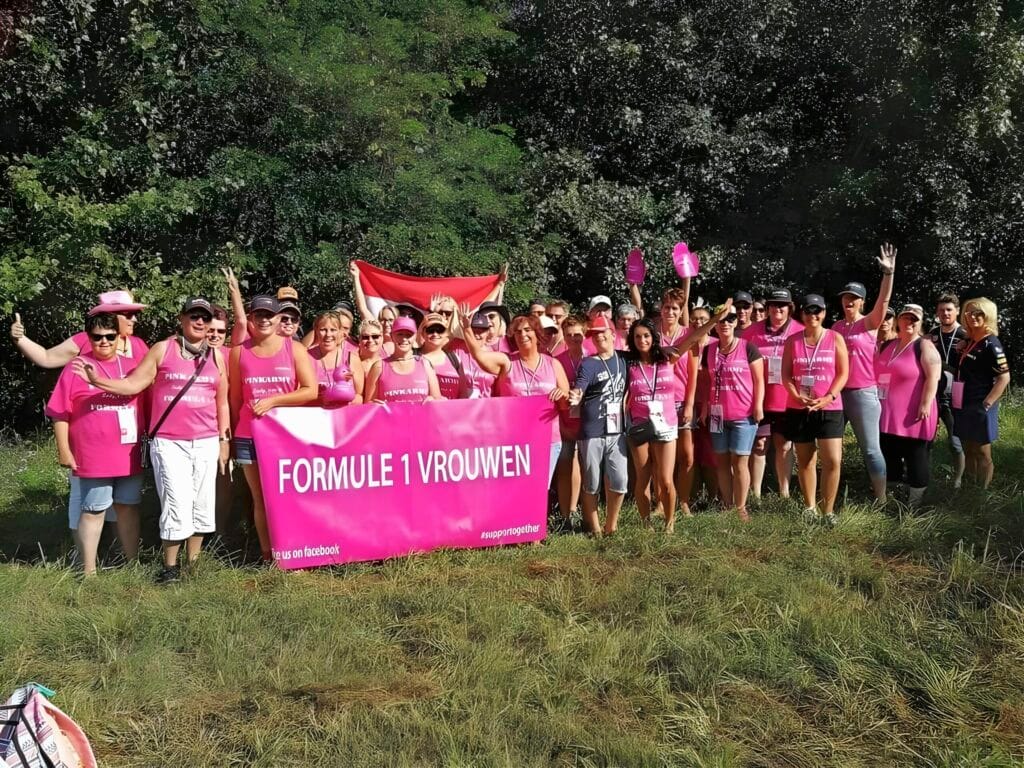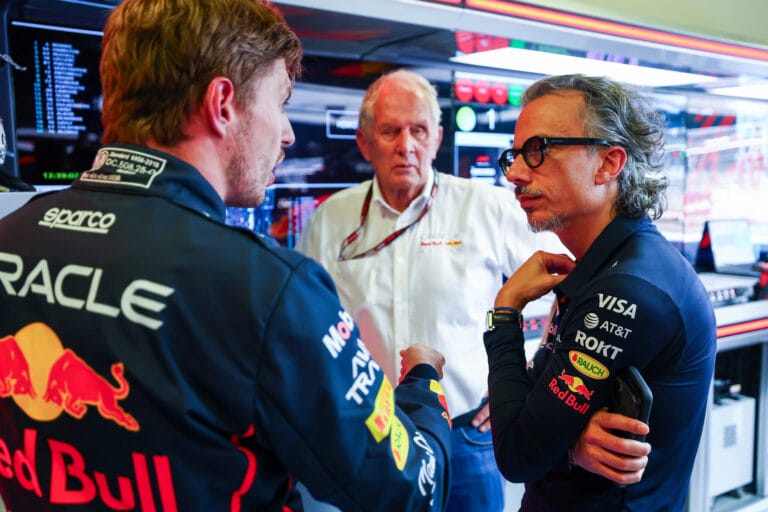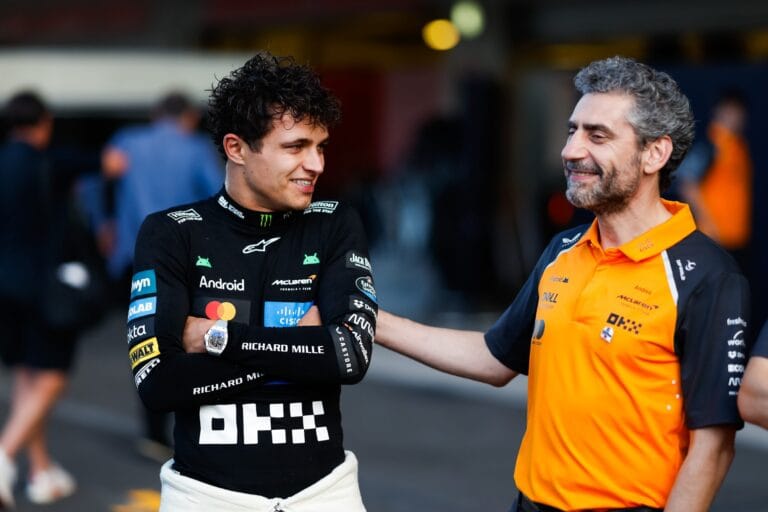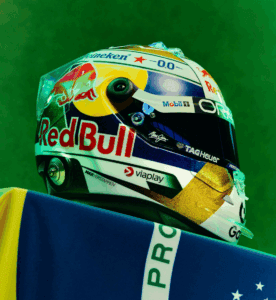Formula 1 has traditionally been a male-dominated sport, both on and off the track. Svenja Tillemans believed it was time for a change. In 2016, she founded Formula 1 Women, a club for women who wanted to discuss Formula 1 and watch races together. This is a look back at an exciting, yet turbulent period. “I received so much backlash,” she recalls.
Formula 1 was a staple in the Tillemans household from an early age. Svenja’s parents watched every Grand Prix and always stayed up for the night races. “We were also members of the Jos Verstappen Club,” recalls the founder of the women’s platform. “So, I grew up with it. Although I also watch many other sports, because they are the best thing on TV.”
She noticed that there were quite a few female fans back then, but they didn’t get the chance to join in the conversation in this male-dominated world. “Female F1 fans had nowhere to express their racing passion, so to speak. And I thought that was a shame,” says Tillemans. In 2016, she decided to do something about it, and Max Verstappen‘s victory in Barcelona was the catalyst for her to take action. “I asked on social media if there was a need for a Facebook group for female Formula 1 fans. I received so many responses in no time that I had organized a fun gathering in Alphen aan de Rijn within two months to watch a Grand Prix together.”
Stepping Out with Grandpa Verstappen
The race was watched over a high tea, as a feminine touch was naturally required. A few months later, she organized a whole weekend in Valkenburg, and that’s where Formula 1 Women really started. “Grandpa Verstappen joined us on Saturday night and we went out with the girls and Grandpa Verstappen. It turned into a big party and on Sunday we went to watch at his place in Montfort. That was also amazing and after that, everything else just fell into place.”
Popularity
The composition of this club is quite diverse, and contrary to what one might expect, a quarter of its members are men. “It doesn’t matter how old you are, how long you’ve been watching, who you’re a fan of, or how much you know about the sport. None of that matters to us. What matters is that you enjoy the sport and want to share that feeling with others.” The most popular drivers among this group, besides Max Verstappen, are Lando Norris and Daniel Ricciardo. Oscar Piastri and Carlos Sainz are also gaining popularity.
Until the coronavirus pandemic, the club organized at least three meetings per year. These included a Formula 1 Women’s Day and a fully organized women’s weekend, which typically attracted between 50 and 100 participants. The club also organized F1 trips to the Grands Prix, with groups of about 25 to 50 people. “Such a trip is naturally more expensive, but I always ensured there was a long-term payment plan, as this makes it much more accessible.”
Even More Passionate Than Men
Organizing such trips obviously takes a lot of time. From the hotel to the food, from a goodie bag to the seats in the stands. “I can easily spend months making sure you really get value for your money. That’s so important to me. And a lot of girls like to travel with me. Why? Because they know they’ll be with mostly women,” Tillemans believes.
Furthermore, the atmosphere among women is very different from when men watch a race. “We were once followed by ‘Hart voor Nederland’. They told me that we watch Formula 1 in a different way, that we pay attention to different things and make more jokes,” says Tillemans. “But also that we are a closer group and even more passionate spectators than men, but in a very relaxed way.”
(Text continues after the image)
The Downside
However, it’s not all fun and games: a less pleasant period follows for Tillemans. “Actually, since Max Verstappen won his first title, it’s become less fun on social media. The constant fueling of the fire and the increased rivalry, that’s really a shame,” says Tillemans. “I do notice that we are one of the few Facebook pages where almost no disrespectful words are spoken by the people who follow us. This is also because we are on top of it and nip bad behavior in the bud.”
Moreover, there has been a quiet period around the meetings since last year. A deliberate choice, as the resident of Alphen aan den Rijn explains. Not only was she dealing with health issues, but her public role against the boundary-crossing behavior in F1 also took a significant toll on her. “Last year, out of the blue, I was approached by several women to stand up for them and to address this issue. Also, to see if I could possibly change certain things from my role. Of course, it’s an honor that they trust me, but it was and still is quite challenging.”
Boundary-Crossing Behavior
“On social media,” Tillemans continues, “I received so much flak whenever I posted something about this. Like that incident of boundary-crossing behavior during the Dutch Grand Prix. I said that some things needed to be adjusted because this was not going well. I then received private threats with very menacing texts. And it’s very strange, but the filthiest and most disgusting reactions I received were from women.”
She also received many responses from men who thought that women should just get used to it, that women are asking for it themselves, and that the women in question should speak up for themselves. “I certainly agree with the latter, but I can understand as a woman that you freeze up when you’re facing a group of men who hurt you. But let’s turn it around: men, what are you doing to prevent this?”
Self-Protection
Reports on this matter are still coming in, and Tillemans continues to work on them. For self-protection, she hardly ever speaks out about this anymore, but behind the scenes, she does inform the organization of the Dutch GP about it. “There are many small things they can adjust on the circuits, and I’m not just talking about Zandvoort, to make it more enjoyable for everyone.”
Of course, these are incidents, and fortunately, things usually go well on the circuits, but the 35-year-old founder of this women’s club believes that things used to be different. “It’s also because Max is pretty much the biggest sports hero in the Netherlands. We are a chauvinistic country, so we stand behind our pride and no one should touch that. I think that’s beautiful and I’m also incredibly proud of Max and how he does everything, but there is a downside: off the track, things sometimes happen that shouldn’t be. I hope,” Tillemans concludes, “that this will change in the future.”









